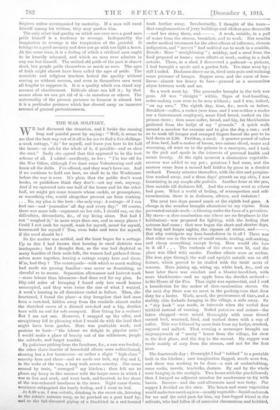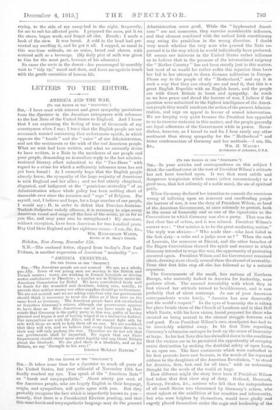THE WAIT. SOLITARY.
WE had discussed the situation, and I broke the ensuing long and painful pause by saying : " Well, it seems to me that the best way out of it all is for me to find a five-shillings- a-week cottage, do' for myself, and leave you here to let half the house—or sub-let the whole of it, if possible—and so clear the rent." Sadly she agreed that this appeared to be the best scheme of all. I added—needlessly, to her : " I'm too old for the War Office, although I've done some Volunteering and still know all the drills. I've offered, and they won't have me. And if wo continue to hold out here, we shall be in the Workhouse before the war is over. It's plain that the public don't want books, or publishers think they don't—not my sort, anyway. And if we squeezed into one half of the house and let the other half, we might get some tenants whose cackle, or gramophone, or something else, would altogether prevent me from working. . . . No, my plan is the best—the only way: A cottage—if I can find one—and journalize' all day and every day." Of course, there was more talk—argument on her side, I should say, on the difficulties, discomforts, &e., of my living alone. But had I not " roughed it," in more ways than one, and in many places ? Could I not cook for myself, wash for myself, mend for myself, housemaid for myself ? Yea, even bake and brew for myself, if the need should be So the matter was settled, and the hunt began for a cottage. Up to this I had known that housing in rural districts was inadequate ; but I thought that, as the war had depleted so many families of their male-folk, the women had gathered them- selves more together, leaving a cottage empty here and there. Wm, had they ? The countryside—with which so much walking had made me passing familiar—was never so flourishing, so cheerful as to means. Separation allowances and harvest-work —more labour than labourers—had done evil for my plan. In fifty-odd miles of tramping I found only two small houses unoccupied, and they were twice the size of what I wanted. A week's hunting in all directions ended in failure. Then, dis- heartened, I found the place—a tiny bungalow that had once been a cartshed, hidden away from the roadside almost under the thatched caves of a disused cowshed and a big, derelict barn with an owl for sole occupant. How fitting for a recluse! But I am not one. However, I snapped up tho offer, and straightway fell to planning what I would do with the land that might have been garden. Hero was profitable work, and pastime to boot—" the labour we delight in physics pain." I would make a place of beauty out of the wilderness, people the solitude, and forget trouble.
By judicious picking from the furniture, &c., a van was loaded ; the other three-fourths of household effects were redistributed, showing but a few barenesses—or rather a slight " high-class " scarcity here and there—and we made our trek, my dog and I, in the wake of the van, a long walk across country. She came around by train, " arranged " my kitchen ; then left me to please my fancy in like manner with the larger room in which I was to live and work, and went back, sad-hearted, to her share of the war-enforced loneliness in the town. Night came down; weariness subjugated the lonely feeling, and I went to bed. At 8.30 a.m. 1 was outside, drinking in the sweet air, listening to the robin's autumn song, as ho perched on a post hard by, and to the full-throated piping of a blackbird in a red-berried bush further away. Involuntarily, I thought of the town— that conglomeration of jerry buildings and all that goes therewith —and her rising there, and . A wash, outside, in a pail of water from the stream, breakfast, and to work. But months under medical treatment for the after-effects of influenza, chronic, indigestion, and " nerves " had unfitted me to work in a muddle, Result : More " straightening " ; midday, and a meal from the food prepared at home ; more efforts at work, ending in a dash outside. There, in a shed, I discovered a godsend—a pickaxe, I had brought a spade and a garden fork. Tea-time went by ; still I toiled. Darkness drove me in, tired unto pain and realizing some pressure of hunger. Supper over, and the curse of lone- liness—almoSt too heavy to bear—yawned as a measureless abyss between work and me.
So a week went by. The provender brought in the• trek was gone. All was " straight " within, Signs of tool-handling, order-making man were to be seen without ; and I was, indeed, " on my own." The eighth day, time, &c„ much as before. Breakfast—coffee, a rasher (war time, and I was neither a trader nor a Government employee), some fried bread, cooked on the primus stove ; then more coffee, bread, and big, fat blackberries gathered from the hedge of my " grounds." A quick walk around a meadow for exercise and to give the dog a run ; and so to work till hunger and cramped fingers forced the pen to be laid down at 2.30. Problem, a meal. A quarter-pound of cubes of lean beef, half-a-rasher of bacon, two onions sliced, water and seasoning, all went on to the primus in a saucepan, and I took to the pick and spade in the interests of personal. health and scenic beauty. At the right moment a diminutive vegetable- marrow was added to my pot ; potatoes I had none, and the marrow came from a mound half hidden by grass in a derelict orchard. Twenty minutes thereafter, with the dirt and perspira- tion washed away, and a three days' growth on my chin, I was luxuriating in my simple olla podrida. Another hour at the pen, then outside till darkness fell. And the evening went as others had gone. What a world of feeling, of retrospection and self- examination, there is in darkness, silence, and isolation !
The next two days passed much as the eighth had gone. A change in the weather brought alterations to my regime. Rain prevented outside work—a blessing under the form of a privation. My stove—a slow-combustion one (there are no fireplaces in the habitation)—was prepared for lighting, with the fooling that autumn had come ; that now began the short and shorter days, the long and longer nights, the rigours of winter, and—. But why anticipate my lone-handedness in it all ? There was that other one in the town of small minds, trading, self-seeking, and cheap everything except living. How would she fare in it all ? . . . The contents of the stove were lit, and the place was filled with smoke. Further efforts were as useless. The iron pipe through the wall and upright outside was an old fixture, which proved to be stuffed with the birds' nests of seasons. More joining up, wiring up, white lead, &c., and an hour later there was comfort and a bloater-breakfast, with more blackberries—and an apple from the derelict- orchard— in the House of the Pen. That night was equinoctial, and I said a benediction for the maker of slow-combustion stoves. On the next day there was no meat in the packing-case that does duty for a larder. Work, mood, the preciousness of time, and a stubbly chin forbade foraging in the village, a mile away. So a " dry hash " was made, in intervals when the verbal flow. trickled instead of running. Boiled potatoes and onions—the latter chopped—were mixed thoroughly with some tinned corned beef, seasoned, fried, and washed down with a cup of coffee. This was followed by more fruit from my hedge, crushed, sugared and milked. That evening a messenger brought me sixpennyworth of " meaty " bones from the village, for stew in the first place, and the dog in the second. My supper was made mainly of carp from the stream, and not for the first time.
The fourteenth day : Overnight I had " tubbed " in a portable bath in the kitchen ; now imagination flagged, words wore few, and there was washing to be done—a suit of underclothing, some socks, towels, teacloths, dusters. By and by the whole were hanging in the sunlight. Two hours with the pen followed; then I foraged an adjacent meadow for mushrooms to fry with bacon. Success—and the mid-afternoon meal was tasty. For supper I decided on the stew. The bones and some vegetables would make two meals apiece—mostly vegetable—liquid and mush for me and the solid part for him, my four-legged friend in the solitude, who had fallen ill of muscular rheumatism and hobbled,
crying, to the side of my camp-bed in the night, frequently, for me to rub his affected parts. I prepared the moss, put it on the stove, began work, and forgot all else. Result : I made a hash of the. stew. It was burnt. A cold in the head had pro. vented my smelling it, and he got it all. I supped, as usual in this war-time solitude, on an onion, bread and cheese, with watered milk as a beverage. (My daily pint of milk was given to him for the most part, because of his ailments.) So came the oasis in the desert—her prearranged bi-monthly visit to " tidy up," mend and darn, and leave me again in touch with the gentle amenities of human life.





















































 Previous page
Previous page